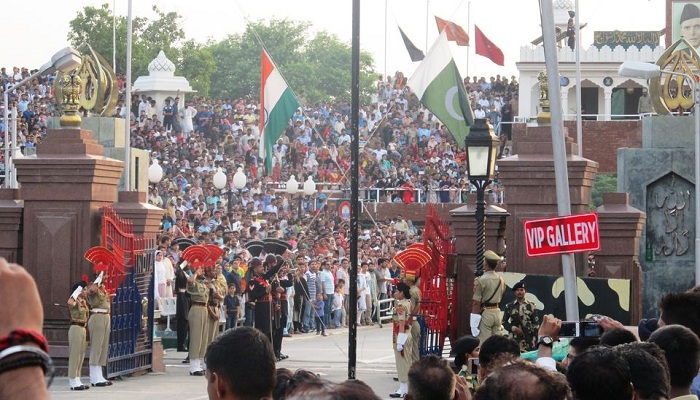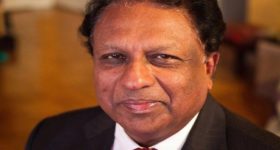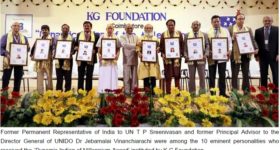A peep into Pakistan
 The Marriott Hotel, the first five star hotel, built in the centre of Islamabad is a unique institution, where the major international events take place, important guests stay and the glitterati assembles to brighten up their evenings. It is a virtual fortress, where even the hotel staff will not assist you with the baggage till you are cleared by the security paraphernalia. Most international visitors to Islamabad confine themselves to its premises because of security concerns, which are palpable. Everyone asks you to be careful about security even inside the hotel, but it is not clear what one can do to be careful. The Marriott has run down a bit, but it just cannot afford to blink. It was from this vantage point that I had a peep into Pakistan for the first time.
The Marriott Hotel, the first five star hotel, built in the centre of Islamabad is a unique institution, where the major international events take place, important guests stay and the glitterati assembles to brighten up their evenings. It is a virtual fortress, where even the hotel staff will not assist you with the baggage till you are cleared by the security paraphernalia. Most international visitors to Islamabad confine themselves to its premises because of security concerns, which are palpable. Everyone asks you to be careful about security even inside the hotel, but it is not clear what one can do to be careful. The Marriott has run down a bit, but it just cannot afford to blink. It was from this vantage point that I had a peep into Pakistan for the first time.
For someone, who dealt with Pakistan from different parts of the globe, stepping on the Pakistani soil was an emotional moment. I knew many Pakistani diplomats and despite the trust deficit in bilateral relations, many of them had become friends, particularly in capitals like Nairobi and Vienna, where our agendas coincided and the mutual obsession was not in evidence as in New York, Washington or Geneva. At the International Atomic Energy Agency (IAEA) In Vienna, my close comrades were the Ambassadors of Israel and Pakistan, who had common interests and concerns as non-signatories of the Nuclear Non-proliferation Treaty (NPT). It was Ambassador Shafqat Kakakhel, my colleague in Nairobi, who suggested that I should participate in the Sustainable Development Conference 2017 (5-7 December) of the quarter century old Sustainable Development Policy Institute (SDPI). The idea of visiting Pakistan for the first time was an attractive proposition, but the hurdles appeared insurmountable in the present state of India-Pakistan relations. The idea of my visiting Pakistan did not appeal to any of my relatives and friends and the reactions ranged from indifference to panic. “Stay safe” was the refrain from all, behind which were apprehension, warning and a sense of resignation. I half heartedly filled in forms, asked the Ministry of External Affairs for assistance etc on the assumption that it will not happen. Ambassador Kakakhel, the Chairman of the Board of Governors of SDPI placed me on a panel on education, given my recent experience in education reform, so that I did not have to touch upon security and other sensitive issues, which he called “a quagmire”. But the concern was about logistics rather than politics.
Most countries, even best of friends, are very particular about following the strict regimen for visa and unless the online application is accepted by the machine and all other formalities are not completed, one cannot even contact a human being to answer questions on consular matters. The human element has been totally eliminated. In one case, I could not go beyond the first line on the online application, as the computer rejected my surname as “error” from the start. No one could explain why my name as in the passport became “error” for the computer. But in the case of Pakistan, the visa began chasing me with the request that I should merely produce the passport in Delhi and get my visa, regardless of the state of my application. The only hassle was of getting my diplomatic passport to Delhi and back! Senior diplomats of the Pakistan High Commission kept a constant vigil on two holidays to give me a visa, which arrived exactly 24 hours before I was to board the flight. Obviously, the SDPI, with its tremendous clout, had pulled the right wires to make it happen. It was incredible that my happiest experience of getting a visa was in the case of Pakistan. The mood changed from apprehension to anticipation when the Pakistan High Commissioner in Delhi telephoned me to wish me bon voyage.
What struck me most on arrival at the Islamabad airport was that Pakistanis are a little worse than us in travel decorum and etiquette. If you stood in a line, you would just stand there, while hundreds will overtake you with no consideration whatsoever. Sadly, the same happened in the elite lines for buffets at the conference. I had somehow thought that the “app pahle” culture was part of the Pakistani ethos.
Another eye opener was that how much of a myth it is to equate India and Pakistan as most countries do. The hyphenation that many countries have developed between India and Pakistan is the priceless legacy that Pakistan has acquired because of the internationalisation of the Kashmir issue and other differences. There is no comparison between the two in any area, particularly after the liberation of Bangladesh. Islamabad is only as big as a Delhi suburb with a two million population and broad roads with modest traffic. In sharp contrast to New Delhi, Islamabad has only two five star hotels and the international airport has only one departure gate! Like the “equation” between the US and the USSR during the Cold War era, the best kept secret is that there is nothing to equate Pakistan and India except the nuclear capability, which eliminated the military imbalance. Pakistan is many years behind us in virtually everything. The style and sophistication of the Pakistani diplomats abroad had led me to expect a better style of living in Pakistan.
But yet, the obsession with India is palpable everywhere. The whole conference agenda was to study the comparative statistics of India and Pakistan in the guise of studying South Asia. On the fringes were Bangladesh and Sri Lanka and nothing else. The review of the higher education scene indicated that Pakistan was behind us in every area, except perhaps research, which showed better productivity than SAARC and BRICS countries.
In my own presentation, I recounted the challenges faced by educational reformers in India because of the extreme reluctance to touch an established enterprise, which somehow was performing the basic requirements of education. Any attempt to tinker with it is expensive and risky. Educationists in India, like in other South Asian countries, went about their business as usual attitude, while the rest of the world transformed their education in the last ten years, more than it did in the last hundred years. Rote learning, with standardised examinations and uninspiring classrooms with extremely low engagement continues. There are exceptions, particularly in private institutions, but they are being controlled to follow the norm by regulatory agencies. The scholars from Pakistan, who took part in the discussions endorsed every word that I spoke and went on to describe an even more disturbing picture of education in their own country.
The agenda of the conference was very extensive and several parallel sessions were necessary to accommodate the speakers. The resource persons at the Institute prepared the sessions well and provided the statistical data, wherever necessary.
Islamabad does not have much to offer in terms of heritage sites or monuments and though it has wide avenues, the absence of skyscrapers and neon lights, gives the city a dull appearance. There is an eerie silence and a disturbing calm and occasionally disturbances erupt and the army moves in with an iron hand to nip them in the bud. I was in Islamabad when China issued an advisory to its nationals to take security precautions. I believe as many as a dozen Indian invitees pulled out of the conference for security concerns. But the army is not visible on the streets. The diplomatic enclave, where our High Commission is located, is a fortress with the lovely gardens and the architecture of the missions hidden away from public view. Chanakyapuri in New Delhi presents a delightful contrast in terms of charm and convenience though security is not lacking there also. The Indian High Commission is gearing up for the arrival of a new High Commissioner, Ajay Bisaria, till recently Ambassador to Poland, who will have to find his way around the present impasse in diplomatic relations.
Most Indian diplomats are either “hawks” or “doves”, when it comes to Pakistan, but I returned after a peep into Pakistan with some sympathy for a nation, which is unable to realise its potential because of denial of democracy, extremism and terrorism. On the day of my return, ‘Dawn’ carried an Op-ed by a former Ambassador to the United States, Ashraf Jehangir Qazi, entitled “Why should India try to destroy Pakistan when the country’s rulers are doing it themselves?”
Profile of the Writer:
T.P. Sreenivasan, (IFS 1967)
Former Ambassador of India and Governor for India of the IAEA
Chairman, Academic Council and Director, NSS Academy of Civil Services,
Director General, Kerala International Centre.
Cell (91) 9847721656
www.tpsreenivasan.com
twitter.com/sreeniv
J-3, Jawahar Nagar,
Trivandrum-695 003
Books
VENKAT FOREVER- A Tribute to Ambassador Venkateswaran
Editors: T.P.Sreenivasan, Jim Peck
Publishers: KPR Nair (KONARK)
APPLIED DIPLOMACY THROUGH THE PRISM OF MYTHOLOGY
Author: T.P.Sreenivasan Editor: Dr.Divya Iyer Publisher: Shobit Arya
MATTERING TO INDIA
Author: T.P.Sreenivasan Pearson
ENCOUNTERS
Author: T.P.Sreenivasan
WORDS, WORDS, WORDS- ADVENTURES IN DIPLOMACY
Author: T.P.Sreenivasan Pearson





